This tutorial will help you learn how to replace an if/else statement with a more concise shorthand syntax called the ternary operator.
The conditional operator – also known as the ternary operator – is an alternative form of the if/else statement that helps you to write conditional code blocks in a more concise way.
The syntax for the conditional operator looks like this:
conditional ? expression_when_true : expression_when_false;First, you need to write a conditional expression that evaluates into either true or false. If the expression returns true, JavaScript will execute the code you write on the left side of the colon operator (:) when it returns false, the code on the right side of the colon operator is executed.
To understand how it works, let's compare it with a regular if/else statement. Let's say you have a small program that assigns different exam grades depending on your exam score:
- When you have a score higher than 80, you assign "A" as the grade.
- Else, you assign "B" as the grade.
Here's one way to write the program:
let score = 85;
let grade;
if(score >= 80){
grade = "A";
} else {
grade = "B";
}
console.log(`Your exam grade is ${grade}`);Alternatively, you can write the above code using the ternary operator as follows:
let score = 85;
let grade = score >= 80 ? "A" : "B";
console.log(`Your exam grade is ${grade}`);And there you go. The ternary operator shorthand looks way more concise and shorter than a regular if/else statement.
But what if your code requires multiple if/else statements? What if you add "C" and "D" grades into the evaluation?
let score = 85;
let grade;
if(score >= 80){
grade = "A";
} else if (score >= 70) {
grade = "B";
} else if (score >= 60) {
grade = "C";
} else {
grade = "D";
}
console.log(`Your exam grade is ${grade}`);No worries! You can write multiple ternary operators to replace the code above like this:
let score = 85;
let grade = score >= 80 ? "A"
: score >= 70 ? "B"
: score >= 60 ? "C"
: "D";
console.log(`Your exam grade is ${grade}`);However, it's not recommended to replace multiple if/else statements with multiple ternary operators because it makes the code harder to read in the future. It's best to stick with either if/else or switch statements for such cases.
Thanks for reading this tutorial
If you enjoyed this article and want to take your JavaScript skills to the next level, I recommend you check out my new book Beginning Modern JavaScript here.
The book is designed to be easy to understand and accessible to anyone looking to learn JavaScript. It provides a step-by-step gentle guide that will help you understand how to use JavaScript to create a dynamic application.
Here's my promise: You will actually feel like you understand what you're doing with JavaScript.
Until next time!


